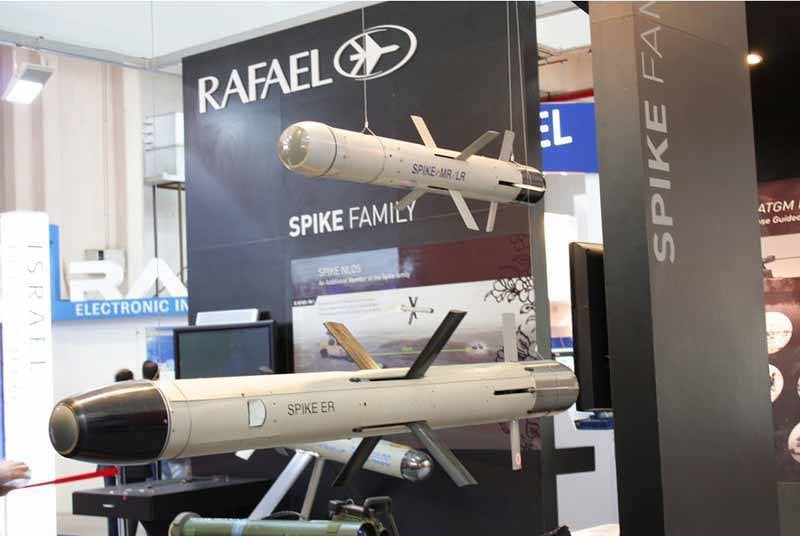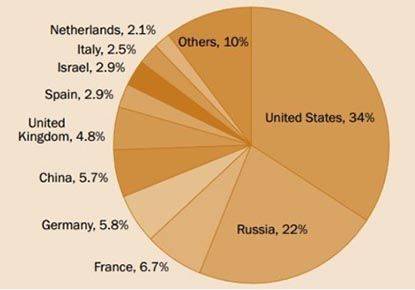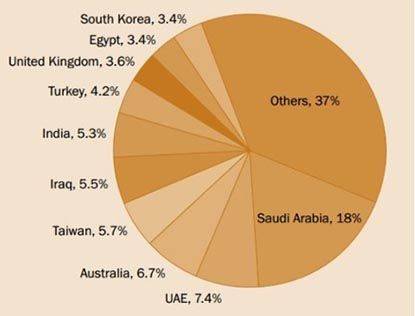Arms trade. Israel. A look from Stockholm

The Stockholm Peace Research Institute (SIPRI) (Stockholm International Peace Research Institute, SIPRI) - an international institute for the study of peace and conflict issues, primarily arms control and disarmament issues, was established in 1966. Since 1969, the yearbook releases the SIIPM (SIPRI). The Russian edition has been published since 1995 and is being prepared jointly with the Institute of World Economy and International Relations of the Russian Academy of Sciences (IMEMO RAN).
Over the years, the institute has been tracking international trade in the defense sector, ranking the countries of exporters and importers weapons, and thus assesses sales in the global arms market. By the way, one of the main questions that this institution is looking into is whether the world becomes less stable when these sales volumes increase? Or, on the contrary, does the world acquire greater stability due to the emerging deterrent factor, which does not stimulate a war?
SIPRI publishes the results of its research in the form of a report every four years. The last of them concerns the period from 2013 to 2017, and it follows from it that over the past four years, Israel, as a manufacturer and exporter of advanced weapons, has risen from tenth to eighth place. In fact, Israel, which now accounts for 2,9% of the volume of international sales in the defense sector, shared a place with Spain 7-8. At the same time, Spain, which kept its share in world sales unchanged, increased exports by 12%. Israel, in order to rise from 2,1% in the past to the current 2,9%, increased its sales by 55%. Which further emphasizes the rapid growth of exports of the Israeli defense industry, bringing the country, thus, about 11 billions of dollars a year. And the potential here is truly unlimited.
Israel has overtaken the owners of long-standing traditions in the field of arms trade: Italy, which today accounts for 2,5% of the international defense market and Holland with 2,1%, has bypassed Israel in the last report. By the way, if in the previous report, Israel was mentioned only 7 times, in the current Jewish state it was noted already 26 times, which also indicates a sharp increase in the volume of activity.
Israel sells the most weapons to India: 49% of all Israeli defense exports goes to this country, followed by Azerbaijan - 13% (by the way, the Muslim Shiite country), and then Vietnam (6,3%). The production of the Israeli "defense industry" is 8,4% of all weapons purchased by Italy, for South Korea, this figure is 4,6%, for Britain - 4,3%. In general, we are talking about sales in dozens of countries around the world.
Israel sells modern high-tech equipment. Exactly what you can demand a high price, since the competition in this area is small. These are smart missiles, radar systems, sensors, and of course UAVs that have become the emblem of Israeli defense exports throughout the world.
On the other hand, Israel occupies the 17-th place in the procurement of weapons (1,7% of the total international sales in this area), sharing it with Oman. Who is he buying from? First and foremost, of course, in the United States (60% of its total defense imports). It is understandable, because so the US military aid returns to the United States. This is mainly the cost of the F-35 aircraft. Nine of them are already in Israel, and there will be fifty in all.
One third of defense purchases falls on Germany - these are submarines. Two have already been received, three more on the way. Another 10% falls on Italy - a huge deal to acquire training aircraft.
It should be noted that over the past three years, Israel has significantly increased its defense imports - from 0,8% of world sales to 1,7%. But above all, this growth was due to the acquisition of submarines, which, of course, often do not buy.
As instability increases in the world, the international defense market is growing rapidly. Since the previous report, it has increased by 10%. This is a very serious growth that turns the defense market into extremely attractive for international business. It is worth noting that it reached its maximum in the 80-ies, during the Cold War. Then there was a decline in 90-x, which accompanied the collapse of the USSR and reached its minimum in 2000 year. And with 2005, the market began to grow again, although it still did not rise to the level of 80. The reasons for the growth are obvious: Islamic terror, the return of opposition to the West and Russia, the intensification of China and North Korea, the war in the Middle East, Iran and the Sunni-Shiite schism.
Lead in defense exports by a wide margin from the rest of the US - 34% of the global market (30% three years ago). In turn, Russia went down from 26%, according to a previous report, to 22% in the current one. In third place is France - 6,7%. Then Germany - 5,8%, in fact, solely due to the sale of submarines (in other words, a deal with Israel is a necessity for her, and not a favor at all to the Jewish state). Then China with an unexpectedly low rate - 5,7%. Even less successful Britain is 4,8%, the very Britain which at other times was the most powerful power of the world. And finally, Spain and Israel with their 2,9%.
In other words, Israel was in the top league of defense manufacturers in the world, in the top trading league.
It should be noted that only Israel has a tremendous restriction in the sale of its defense industry. He does not sell his products to any Arab or Muslim countries (with the exception of Azerbaijan). Sales to the Turks, which were quite substantial in the past, also ended, because it is impossible to rely on the absurd "Sultan". Thus, a huge segment of the world market, perhaps the largest, is closed for Israel. Which only further emphasizes his success.

It should be noted that if anyone is deeply tied with the Arabs in the supply of weapons, it is France. That, by the way, is also one of the explanations of her cool, if not more, attitude towards Israel. Nearly half, 42%, of its defense exports falls to the Middle East. French sales increased compared to the previous SIPRI report by 27%, and four years ago the share of the French in the global arms market was 5,8%, now it has reached 6,7%. Its main clients are: Egypt - 25% (in this country, the rapidly growing population has nothing to eat, but the army buys new types of weapons to protect themselves from Islamic extremists), China (8,6%), India (8,5%). And, of course, Saudi Arabia, the United Arab Emirates, Qatar, Kuwait, Morocco and Singapore. Not so long ago, against the backdrop of France, one of the traditional world leaders in arms exports, Israel seemed literally a crumb. Now the Israeli share in the global market reaches almost half of the French market and continues to grow. This is amazing data that is hard to believe at once.
It is worth paying attention to Turkey. Her success can not fail to impress. It increased its share of the global arms market from 0,4% to 0,8%. It sells mainly low-technology equipment, mainly armored personnel carriers, which we saw in the battles of the Syrian Afrin.
But the main consumer in the arms market is India today, whose purchases make up 12% of the entire world market. In this regard, it even bypassed Saudi Arabia, which, due to the opposition to Iran, in recent years has increased its arms imports from 3,4% of the world market to 10%. The Saudi market, alas, is closed for us. At least for now. But the time when we can offer certain types of weapons to the Saudis is clearly approaching.
On the other hand, Indian purchases from Israel in the defense sphere increased by 285% compared to the previous report. India seeks to maintain a deterrent against Pakistan and other Muslim neighbors. According to a new report, Israeli defense exports to India include a huge number of types of weapons, including UAV-kamikaze.
It is expected that the rapid growth of the Indian economy will continue in the coming years, which means that further rapprochement with the Central Asian giant is of critical importance for the Israeli economy. In this sense, the emergence of the new airline of the Indian company Air India to Israel over Saudi Arabia is of strategic importance. Moreover, since India is not a Muslim country, it can be assumed that in the event of a change in the ruling party, relations with Israel will not be interrupted.
Today, literally all countries of the world are striving to enter the Indian market. Only recently, France managed to negotiate a colossal deal with India worth billions of dollars.
The Institute notes that a number of countries are losing ground in the arms market. First on the list is Russia. As noted above, the share of Russian exports in global sales was four years ago, 26%, now reduced to 22%. Behind it is Germany, which has reduced its global market share from 7,4% to 5,8%, there is already very close to the Israeli position. Without the sales of submarines to Israel and Egypt, the reduction in the German share would have been even greater. Germany, overflowing with unskilled and not very eager to work immigrants, losing ground in all respects. Its GDP is decreasing, the birth rate among the indigenous population is decreasing. This means that there is no need to talk about a brilliant economic future. Rather the opposite.
Another country from this company is Ukraine, which in the past had serious positions in the arms market and, by the way, sold it to everyone in a row, including all sorts of dubious structures. Its share has been reduced from 2,5% to 1,7%. Ukraine held at the expense of large enterprises built during the Soviet Union, but every year they decay more and more and lose their competitiveness.
The share of Switzerland, also a country with a long tradition in the arms market, has declined, dropping below one percent to 0,9%. It has also decreased in Sweden, from 2% to the same 0,9% (fortunately, Arabs are buying from her, especially Saudi Arabia and the United Arab Emirates, otherwise it would be even worse). By the way, Riyadh cut the share of its military imports from Sweden after Stockholm dared to criticize them for violating human rights.
Canada shrank from 1% to 0,8%. It is possible that this is the result of the irresponsible activities of the current Prime Minister Justin Trudeau, who managed to spoil everything wherever it was possible.
South Africa with 0,6% dropped to 0,2%. In the past, it was a prosperous rich country, now another of the many corrupt African economies that are derailing.
Finland and Brazil, hesitated, lost the drive and also lost their positions. In a word, like Lewis Carroll’s in Alice in Wonderland: “You need to run as fast as you can to stay in place.” Israel does not have this privilege. To survive, it is necessary for him to rush forward all the time, without turning off the engine.
Contrary to what many believe, Israel for the United States is not such a serious buyer of arms. The main customer there is Saudi Arabia (18% of all US defense exports), which has now increased its military orders to the US 4,5 times. Obviously, this is a direct consequence of the policy of the new president, Donald Trump, who decided to convert the Arab petrodollars into increasing the welfare of the Americans.
Other serious customers include the UAE (7,4%) and Australia (6,7%). The most important component of US defense exports is the sale of combat aircraft. The US successfully sells its brand new F-35, of which 12 has already been transferred to Britain, 10 to Norway, 9 to Israel and Italy, 6 to Japan and a pair to Australia and Holland. In addition, the United States sold three dozen F-15SG Saudi Arabia and 16 Singapore. But on the sale of ships the Americans gave way to Germany, Spain and Holland. In general, the United States supplies weapons to 98 countries.

President Trump has already announced his intention to invest huge sums in the renewal of the American army, which, of course, implies large investments in research, development and innovation. For us here are two important consequences: opportunities for joint research and high-tech industries, as well as the likely increase in sales volumes of our "smart" additives to American weapons.
Thus, new and very promising opportunities in the US market are opening up in front of the Israeli defense industry. Appetizing bids are already starting to be published. The main thing is not to miss the moment.
For example, the sphere of cyber security, of course, can become one of the most important springboards of the Israeli defense industry, since Israel has almost no competitors in this area. Therefore, bringing Israeli achievements in the field of cyber security to the commercial plane can lift it no longer into the top ten, but among the top four exporters of the defense industry. It is in the field of cyber security that defense aspects are most closely intertwined with high technology, the army is facing an information revolution. It is here that Israel has the most advantages over all others.
Continuous attacks, attacked by enemies, and the wars to which they force it, eventually turn inventions into proven in combat and proven to be effective products. All over the world they prefer to acquire weapons that have already been tried in practice.
Israel should strive to expand the list of countries importing its weapons. And this requires public investment - more embassies, sales representatives, and economic attachés, who are specially engaged in this at the embassies and representative offices of Israel. Turkey, for example, succeeded in no small measure due to the opening of dozens of embassies and representative offices in all corners of the planet, primarily in Africa. It is clear that in the end it turns into political capital - politics and security go hand in hand.
The Arab boycott that fell upon Israel from the first days of the country’s existence, and in addition to Western embargoes for selling weapons to it, was forced to create from scratch a powerful defense industry, one of the most successful in the world. Israel did it for itself, but the quality and reputation opened for it a huge global market, which every year only grows.
Based on the article by Dr. Guy Bechor.
Information